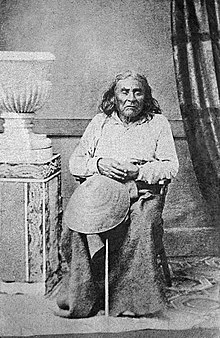 Chief Seattle was given a decision. He could peacefully accept the white man's invitation to live on a reservation with his people or decline and possibly ignite a conflict. As a wise leader whose primary concern was his people's well-being, Chief Seattle spoke well about the white man. He recognized the power the settlers had over his people and foresaw the growth of the foreigners.
Chief Seattle was given a decision. He could peacefully accept the white man's invitation to live on a reservation with his people or decline and possibly ignite a conflict. As a wise leader whose primary concern was his people's well-being, Chief Seattle spoke well about the white man. He recognized the power the settlers had over his people and foresaw the growth of the foreigners.Analogies were used extensively. The natives' ties to nature probably had a large influence on their speech and logic. Chief Seattle described the white settlers as grass that covered the land and his own people as sparse trees. His most dramatic comparison was the flight of the red man from the white man as the mists on the mountain flee before the sun. "Can we be brothers?" was the underlying message that was emphasized by the analogies.
The style of Chief Seattle's speak provokes thought. He reasoned with the idea that the white and red man could be brothers but decided not to take a stance. Not taking a stance displayed more rhetorical power in this case, because he throws the question to the other side. "We shall see" is his way of saying, "We see you as potential brothers but we are waiting to see how you truly see us." The style and tone seem to try and attract some sympathy. He especially appeals to pathos when after talking about the settlers so well, he makes one simple request to have access to the ancestral burial grounds.
Chief Seattle appeared to have the goal of maintaining as much of his people's culture and identity as possible. His choice of rhetoric show his compromising nature as he allows the less important to be taken (land) but requests the more important to remain (burial grounds). He lets the other party feel in control as he expertly weaves his language to influence their emotions and decisions.
I think it is really interesting that you talked about analogies as an appeal to logic. It is interesting to see how different cultures and religions define what is logical. To a member of the LDS church, quoting a Prophet or Apostle would be extremely logical and reasonable, but it all depends on the audience.
ReplyDeleteI do believe that Chief Seattle was "giving control" to the other party, but in a very ironic way (more on this in my own post). I was also impressed with the analogies. Native American analogies are always the coolest. These were especially poignant, however, because they set "the white man" apart from "the red man" as disgraceful to their ancestors, instead of loved and cared for. While the world was looking to the future in the haze of imperialism and militarism, Chief Seattle drew a strong connection to his and his people's past.
ReplyDeleteI think you nailed it right on the head. I mentioned in my post as well that Chief Seattle seems to pass the buck on to the white man as they are the ones to prove their brotherhood. I felt that was a powerful rhetorical tool and perhaps the greatest way he appealed to the 'white man's' sensibilities. The analogies that you wrote about as well are very effective in that they force to think about the issue from the native perspective.
ReplyDelete